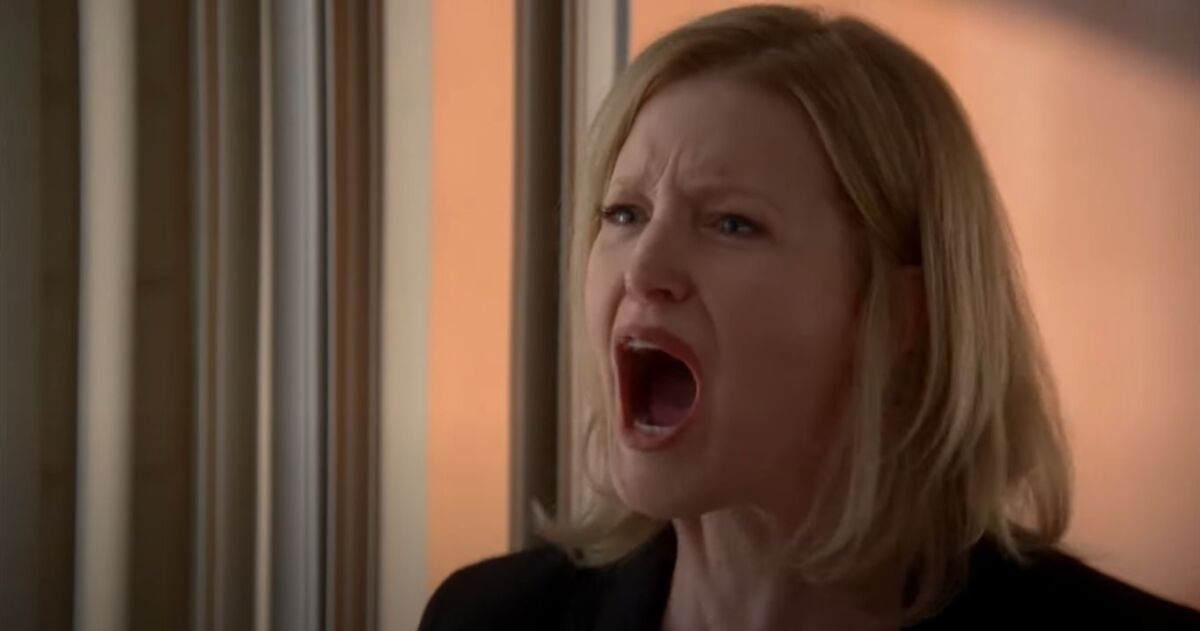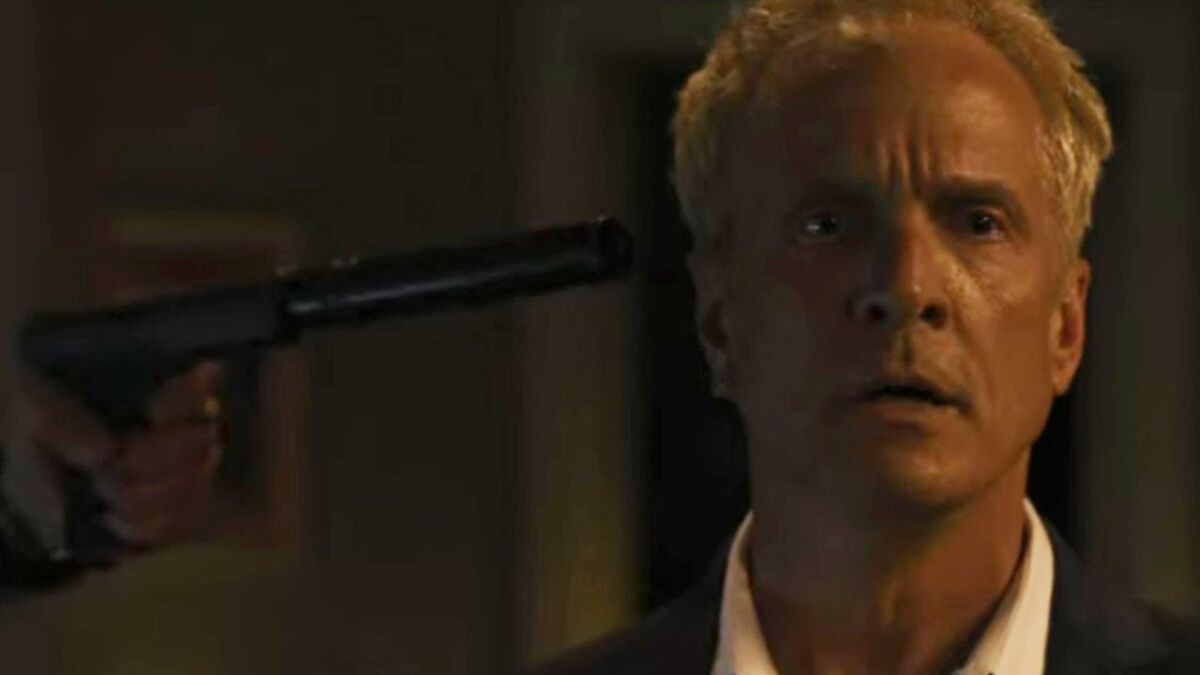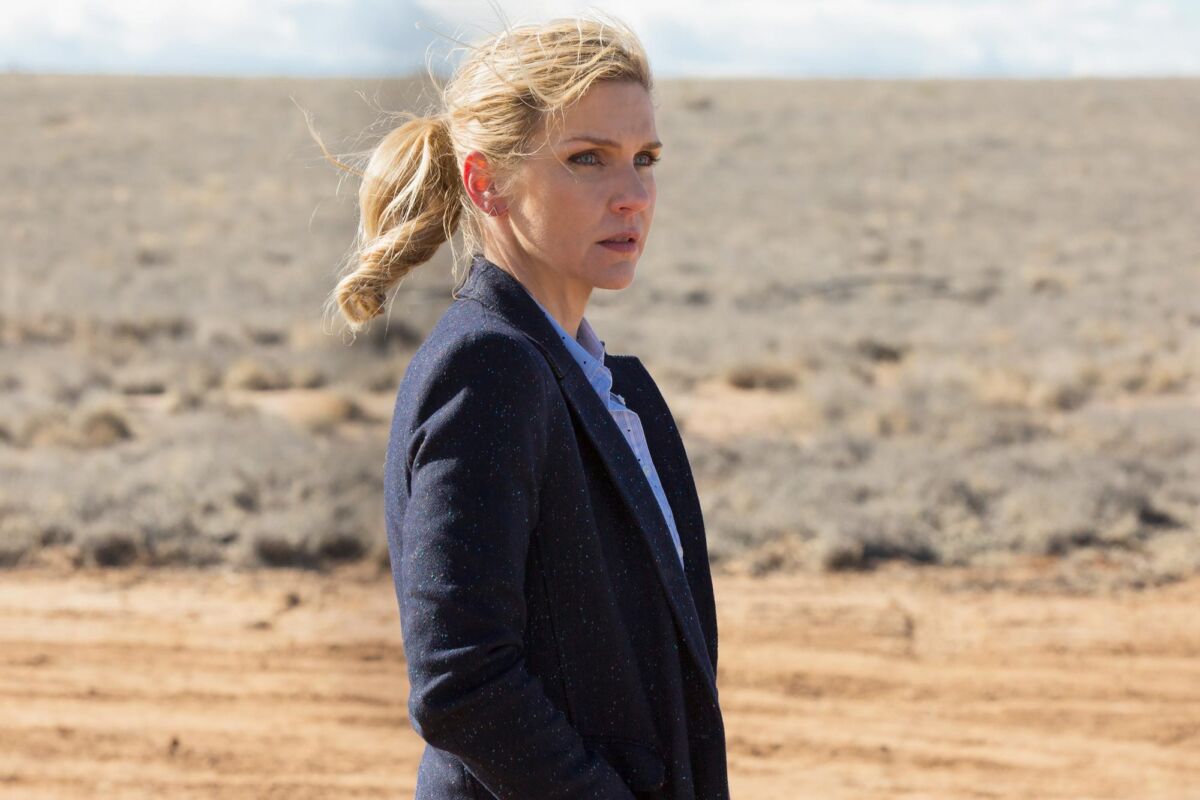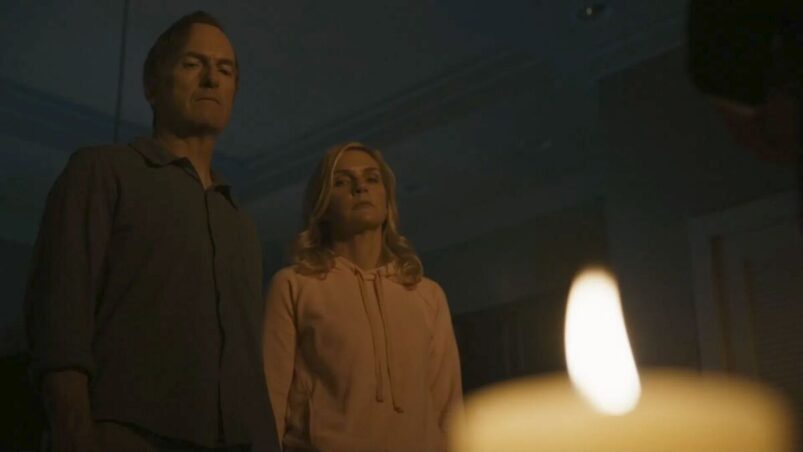
As Better Call Saul comes to a close, I find myself thinking: how is Breaking Bad remembered? Largely as ‘the silly adventures of Walt and Jesse’, but if there’s one other thing about it you’d point to as cultural reference, it might be ‘God, didn’t the fans hate the wife?’
The issue with Skyler is that, almost accidentally, she slid into the role of antagonist. And a more robust antagonist, too, than any number of Tucos and Guses, since she was one who Walt couldn’t simply shoot or blow up. We the audience were tuning in to watch the guy from Malcolm In The Middle become a meth cook, and Skyler, more than any rival gangster or the long arm of the law, was the person actively getting in the way of that happening.
And by the nature of the character, any scenes with Skyler tended to not be scenes in which Walt was off on his silly adventures with Jesse – you know, going about the business of being a meth cook, once again the thing we wanted to happen. So perhaps there’s something Pavlovian about it. Skyler comes onscreen, and we roll our eyes, yes, here we go, time for a scene that’s talking-heavy and meth-light. What’s that, Skyler? Your sister’s a shoplifter? Great.
Skyler wasn’t an untarnished innocent. She’d smoked while pregnant, which is usually exhibit A for ‘this is not a nice person’ – but, I repeat, this was up against her husband abruptly becoming a violent drug dealer. For, as he would eventually admit to her, the sheer jolly thrill of it. As a result most of her real misdeeds were as his accomplice-cum-hostage, and even then, to use an unfortunate phrase, she didn’t even kill anyone.

Most notably, she did cheat on Walt with a man who was clearly a bit of a prat. In a different show, it might have passed as darkly humorous, but to do that to poor put-upon Walt, the viewpoint character – well, why not simply stab every man in the audience in the heart? That’s certainly the way some of them reacted, and, coming from a woman who’s already established herself as the ultimate antagonist, it’s simply twisting the knife.
None of this, of course, comes anywhere near a reason to level abuse and threats against not merely Skyler, but also the actress who played her, Anna Gunn. Having the audience get a little confused and start blaming the performer isn’t unheard of, but traditionally that’s limited to your actual villains (which doesn’t apply here, the men who play the Breaking Badiverse’s various steely Latino crime lords are beloved by the fans).
Let this not come across as making light of what was surely a very unpleasant experience for Gunn. This is taking the vitriol she had to suffer completely seriously, to illustrate the sheer depths of the hatred Skyler had inspired. Because, crucially, it’s not unreasonable to think the prequel show, Better Call Saul, might have learned a little something from this experience.
Presenting Howard as an archetypal corporate dick, smirking away as he denied Jimmy’s advancement, only to then pull the rug out and reveal Chuck was the one behind it all, seems a pretty clear exercise in making the audience hate someone. And not only that, but making it brutally clear that they had been wrong to do so.
Just as it was with Skyler, Howard’s presentation as the irritating and factually harmless antagonist of Better Call Saul was in place from the start. From the endless litany of frustrations Jimmy started out facing, Howard stood above all, the image of the Nietzschean blond beast, and so clearly a well-heeled ‘80s salesman type that he might as well have been trying to bulldoze the plucky kids’ rec center to put up a parking lot.
So when Saul and Kim humiliate Howard professionally, and almost immediately afterwards see his brains blown out in front of them (as a direct result of their other misdeeds), I cannot help but hear in it the wounded scream of Skyler’s revenge. Plenty of people would have loved to see her shot unceremoniously in the head once upon a time, so here we have a pretty good approximation of how that would have played out — and it’s horrible.

Better Call Saul was upfront about this being a moral point of no return for Saul and Kim when they first compose the plan that leads to Howard’s death in an episode actually called ‘Something Unforgivable’. And while it had the pleasing side-effect of settling the Sandpiper case and netting them an awful lot of money, there’s no ambiguity here: this was primarily a matter of getting one over on Howard.
This is a dynamic which Game of Thrones often deployed to great praise, once upon a time – making you the viewer regret having wanted something. And often, as it is here, the death of a particular hate figure. King Joffrey was a Skyler-level hate figure in his day, but when he was actually killed off, it was a painful, ugly experience to watch.
And the instrument of Howard’s death? Our old friend Lalo – a colourful, charismatic, lovable fellow, who you can’t take your eyes off, who the audience accepts into their hearts, and who nonetheless hurts and kills a lot of innocent people. You know, basically like Saul himself.
This clear parallel also has a precedent: towards the end of Breaking Bad, Walt, who’d long since gone skinhead and named himself after actual Nazi Werner Heisenberg, ended up associating with a white power prison gang, but it seems that was too subtle. Amazingly, Lalo never found time to bust out that evergreen villain line “we’re not so different, you and I”.
It’s worth considering Kim’s place in this whole dynamic: another blonde, another female lead (and by now the main guy’s wife, just as Skyler was), and another woman who’s in many ways more capable than our protagonist. But this time around, one who was embraced by the fans and one who, perhaps not coincidentally, egged our protagonist on further in his slide towards evil rather than trying to prevent it.
Curious, then, that Howard was so hated because he wouldn’t give poor sketchy Jimmy a chance in his air-conned legitimate law firm – yet Kim, far more than Howard, has been the one to forever keep Jimmy/Saul out of that garden of Eden, more so even than Jimmy himself. Sure, Jimmy intentionally torpedoed what could have been a long and safe career at Davis & Main in favour of his classic hijinks, but he still had his doubts about being un amigo del cartel. It was Kim who stepped up for him there, and now we’ve seen in bloody detail what fruits that little episode bore.
In a bit of a circle within a circle, the final insult comes when Saul (yes, definitely Saul by that point) and Kim lie to Howard’s bereaved wife to cover their own backs. Howard’s wife had not been presented pleasantly, shall we say. By the time we were even aware of her existence, Howard had gained our sympathy, and so we would not be inclined to think well of a woman who was visibly freezing him out of their marriage even in the face of his attempts to reconcile.
But Howard’s relationship with his wife is – was – their business. This is precisely the personal boundary Kim stomps all over to slander a dead man and reduce his widow to tears, and having done that, it becomes her point of no return. The kind of viewer who didn’t much like Skyler might well have wanted to needle Howard’s wife for her frosty treatment of poor old Howard – Kim does exactly that, politely and professionally, and finds she cannot bear that she’s done so.

This time, at least, the old trick didn’t work. A light smattering of introducing a wife negatively was not enough to have the fans immediately baying for her blood. They didn’t accidentally tip the scales too hard, too soon, as they did with Skyler – they’ve kept it painfully clear who in this equation was the wrongdoer and who was the victim.
As a whole, Better Call Saul has taken us on a very similar journey to Breaking Bad. We wanted to see Bryan Cranston become a drug lord, and we wanted to watch Jimmy devolve into Saul, the sleazy lawyer extraordinaire we remembered so fondly. In both cases, the actual process turned out to be a nasty, brutal one (can you believe the prequel was once to have been a half-hour light comedy?).
It begs the question, though – it may have kept the fans from hating mildly annoying innocents, but has it come close to inspiring anywhere near that kind of hatred for the real villains of the piece? Lalo was if anything too lovable, but I mean the real villains, the people for whom the show tells the story of their descent into evil: Jimmy and Kim.
And the answer, straightforwardly, is no. Even when they find their own misdeeds too much to handle, we do not see this as a matter of just desserts, instead it is a tragic, sympathetic codicil. After all, being wracked with guilt over things you absolutely have done wrong? Why, that could have been any of us.
READ MORE: Ranking The 10 Best Characters In Better Call Saul
Some of the coverage you find on Cultured Vultures contains affiliate links, which provide us with small commissions based on purchases made from visiting our site. We cover gaming news, movie reviews, wrestling and much more.



